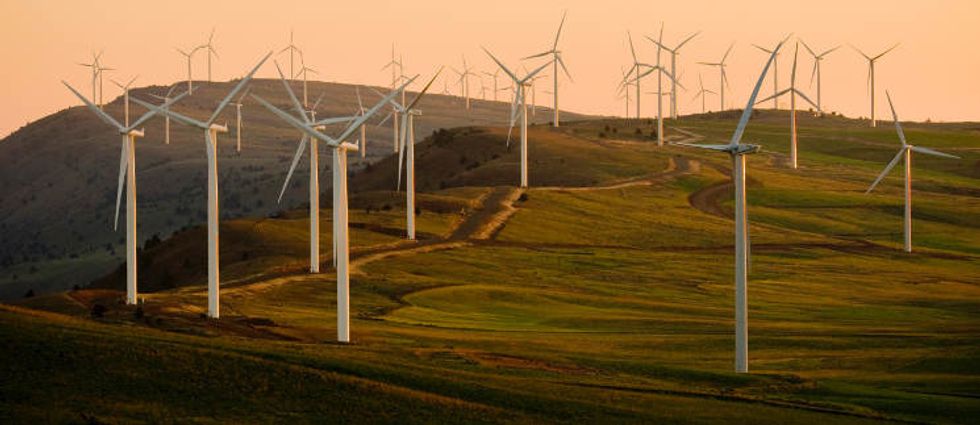
Will 2018 be a better year for US environment policy?
Columnist Peter Dykstra offers some optimism—but expects more of the same in the coming year
It's been a dark and stormy year for U.S. climate advocates since President Trump's election.
The U.S. has abandoned any claim to climate leadership as the only nation to pull out of the Paris Climate Accord. In Trump's Cabinet, climate denial is pretty much cause for a Merit Badge. Congressional leadership doesn't acknowledge climate change to be a problem, or even a thing.
America's two political parties are as far apart as ever on environmental issues. Republicans who may have found enough of a comfort zone to speak out a decade ago – even Donald Trump who with his three oldest kids signed a New York Times climate ad in 2009 —now toe the party's denial line.
Trump put an exclamation point on it this week by tweeting that the snow and cold weather in the Northeast was further evidence of a Climate Hoax.
In the East, it could be the COLDEST New Year's Eve on record. Perhaps we could use a little bit of that good old Global Warming that our Country, but not other countries, was going to pay TRILLIONS OF DOLLARS to protect against. Bundle up!
— Donald J. Trump (@realDonaldTrump) December 29, 2017
At the Environmental Protection Agency, Administrator Scott Pruitt is swinging the wrecking ball at his own agency, banishing the mention of climate change in official documents and grant proposals; slashing staff and budgets; and seemingly crossing the line of a regulatory agency by traveling overseas to peddle U.S. natural gas exports. And a new EPA priority appears to be protecting the boss rather than protecting the environment: Pruitt has pulled field investigators back into his 30+ person security detail.
A two-person firm in Interior Secretary Ryan Zinke's Montana home town somehow landed a massive contract to re-wire Puerto Rico's hurricane-ravaged electrical grid. Whitefish Energy was abruptly fired, and much of Puerto Rico remains in the dark months after Hurricane Maria.
Energy Secretary Rick Perry signed off on $3.7 billion in new loan guarantees for two new nuclear reactors in Georgia. The expansion at Plant Vogtle is the last vestige of a nuclear energy renaissance. It's years behind schedule, on target to double its original budget, and Westinghouse the primary contractor, is in bankruptcy.
Assaults on laws and regulations on mines and pipelines, endangered species, pesticides, safe drinking water, and literally dozens of other environmental cornerstones were in full swing in 2017, and promise to increase in the coming year.
There's virtually no prospect that this retrograde behavior will change. Trump is also re-shaping the courts—blunting one of the built-in remedies for government overreach—for decades to come. Horse-trading on the controversial tax bill took another chunk: Alaska Senator Lisa Murkowski supported tax reform after a go-ahead for oil and gas drilling in the Arctic National Wildlife Refuge was tucked into the bill.
All of this, and one of the relative voices of reason on environment in TrumpWorld is Secretary of State Rex Tillerson. That's right, the former ExxonMobil CEO is pretty much Mister Green these days. And both his clout and future tenure are in serious question.
The news media remains largely unimpressed by such deep changes, focusing instead on legitimate stories like alleged White House scandal and sexual harassment, as well as red herrings like Trump's latest childish tweet and his golf game.
But ...
It's not all bad news, folks.

Will Congressional Climate Crackpot Caucus meet its match: The Congressional Climate Solutions Caucus now boasts 32 Republican members who don't buy into the otherwise party-wide climate denial theme. But the Caucus' GOP members have yet to voice a significant challenge to their party's leadership, let alone bring pro-climate change legislation.
Deniers denied: With the durable exceptions of Fox News and conservative talk radio, climate deniers are increasingly cut off from a national profile. Unless, of course, they are in the Cabinet or congressional leadership.
Wind and solar ascending: If market forces bring clean energy to the forefront, no amount of fossil fealty can stop it. After the opening of the first offshore wind project, more stand ready to follow. Onshore wind is taking off, with noteworthy success in petro-states like Oklahoma and Texas. Solar is withstanding multiple state-level attacks, and growing as well.
Coal still crumbling: The Administration is trying to revive the coal industry, while even its most avid supporters say it's an unrealistic goal. The U.S. coal industry sustained near death blows from its own liabilities, and from the ascendance of natural gas. As wind and solar rise, coal will continue to crumble to dust.
Conservative Civil War, Brother against Brother: For years, Jerry Taylor was a go-to conservative to cast doubt on climate change. In 2014, he left a perch at the Koch Brothers-funded Cato Institute to launch a new think tank, the Niskanen Institute, as a conservative toehold on climate.
But his brother, James Taylor, still lobs climate denial grenades for the Heartland Institute – the group that purchased ill-advised billboards comparing climate activists to the Unabomber and Osama bin Laden a few years back.
Mr. Smith goes to San Antonio: One of the most effective Congressional climate deniers, Lamar Smith, announced that he's calling it quits at the end of the current term. Smith's six-year tenure as Chair of the House Science Committee would have ended anyway, but his mind-boggling jihad against climate science might well continue under the next chair – possibly his Science #2, Dana Rohrabacher. A southern Californian who's fond of surfing, but not clean water measures, Rohrabacher is every bit Smith's match as a climate denier.
Smoky Joe clears out: Another noteworthy retirement at year's end will be "Smoky Joe" Barton, another Texas Republican perhaps best known for apologizing to BP for the federal government's allegedly harsh treatment of the oil giant after the 2010 Deepwater Horizon oil spill. Barton had announced his intention to run again but was snagged in the #metoo movement web when news of his texting selfies of Little Smoky Joe to women emerged.
Neither Smith's nor Barton's seats are likely to leave Republican hands, but two less senior GOP successors will be a loss for the pro-Big Oil, anti-science agenda.
Let's face it—2018 will be another year of rollbacks and setbacks for America's climate and environment policies.
But this country stands in stark opposition to nearly all of the world's nations. We live in interesting times.













